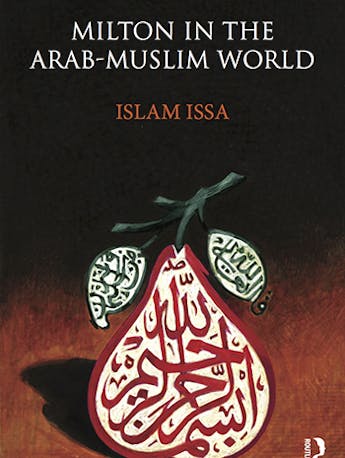UNIVERSITY NEWS LAST UPDATED : 28 OCTOBER 2016

Historic writer John Milton’s work has influenced major Middle East events such as the Arab Spring and the Syrian uprising, and may even have drawn inspiration from the Quran, a new book published has revealed.
Dr Islam Issa, Lecturer in English Literature at Birmingham City University, has written ‘Milton in the Arab Muslim World’, the world’s first dedicated research into the poet’s impact in the Middle East and North African regions, which has already been named this year's Outstanding First Book by the Milton Society of America.
The book, published on Friday 28 October, uncovers that Milton’s writing has been a major influence on the area’s political and cultural figures and events since it was first translated into Arabic in the early 20th Century. In particular through his most famous text – biblical epic ‘Paradise Lost’, which charts the fall of Adam, Eve and Satan.
And the similarities between Milton’s Satan and the Quran’s Iblis suggest the writer may have read the Quran nearly 400 years ago, in his role as the Government’s head of foreign languages – where he had access to the first Western translations of the Islamic holy book.
Censorship
Milton had also spoken out against censorship, using the Quran as a key example – before it was banned in England – and the research suggests its detailed narrations of the fall of Iblis could have inspired sections of ‘Paradise Lost’.
“The first French and English translations were published in the 1640s, and the English one was banned just weeks after Charles I was executed and just four days after Milton had become Secretary for Foreign Tongues, so these events surrounding the Quran would certainly have intrigued him.
“In the last centuries, hardly anything has been said about the parallels between Milton's most famous character and his Islamic counterpart. There are so many parallels that it's uncanny.”
 Milton’s popularity in the region is drawn from the shared elements of the Bible and the Quran found in his writing, as well as his position as a figurehead of republican and anti-establishment movements during a time of civil unrest, eventually leading to the execution of King Charles I in 1649.
Milton’s popularity in the region is drawn from the shared elements of the Bible and the Quran found in his writing, as well as his position as a figurehead of republican and anti-establishment movements during a time of civil unrest, eventually leading to the execution of King Charles I in 1649.
While Milton’s writing about his blindness has been used in Islamic preaching, ‘Paradise Lost’ is viewed in the Middle East as a text of rebellion, opposition and revolution, leading to its influence on figures opposing regimes dating back as far as the Ottoman Empire.
Arab Spring
A rise in popularity of ‘Paradise Lost’ coincided with the Syrian Uprising and the Arab Spring protests across the Middle East in 2011, with a new Arabic translation and a pro-Kurdish Iraqi publication portraying Satan as a ‘legendary and warring hero’ both published that year.
On the other hand the Syrian government, which published the 2011 edition, used it to outline the failings of opposing the state.
In the same year President Assad’s party newspaper featured an article highlighting the fact that the monarchy returned in Milton’s time and that in ‘Paradise Lost’ Satan could not overthrow God, suggesting the Syrian government would overcome any uprisings.
Dr Issa added:
“Add to that the increasingly globalised nature of the Middle East, the surge in English language proficiency and online access, it's no surprise that the book's findings are so relevant to this day and age.”
‘Paradise Lost’ was first partially translated into Arabic in 1937 in an Islamic magazine, despite its references to Christianity.
Milton’s work has been prevalent in the area since and has had a wide reaching impact on the region’s writers, particularly during the Arab Cultural Renaissance of the 19th and 20th Centuries.
Influence
His influence is seen in the fiction of influential writer Tawfiq Al-Hakim and the poetry of Abbas Al-Aqqad and Jamil Al-Zahawi, and there are strong links with the controversial ‘Children of Gebelawi’ written by Nobel Prize for Literature winner, Naguib Mahfouz.
‘Milton in the Arab Muslim World’ has taken six years to write including extensive research which has taken in trips to Egypt and Lebanon, visits to libraries and historic archives, as well as dozens of interviews with translators, publishers, novelists, students and academics.
The book will be officially launched on Wednesday December 14 at Birmingham City University.